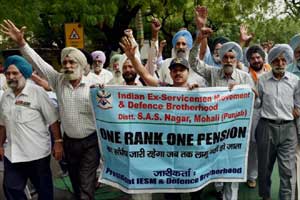The Centre’s weak finances may force it to defer the implementation of the One Rank, One Pension (OROP) scheme for the armed forces to the next fiscal year, sources said.
Under OROP, a uniform pension will be paid to armed forces personnel, who retire at the same rank after the same length of service, regardless of their date of retirement. Additionally, the government announced that these benefits would be given retrospectively from July 1, 2014, with arrears to be paid in four half-yearly installments, with pensions re-fixed every five years.
The OROP scheme will add to the government’s fiscal burden due to a higher pension outgo. It estimated that the one-off hit due to arrears could be `10,000-`12,000 crore in FY16, if the scheme is implemented this year. The recurring annual additional cost will be in the region of `8,000-10,000 crore, and could increase in the future after pay structure is revised based on the award of 7th Pay Commission. The Pay Commission report, which is due by December end, would reset the salaries and pensions of central government employees.
With a potentially lower divestment proceed (possibly half of the target of`69,500 crore) and an anticipated shortfall in tax collections of about `50,000 crore putting the FY16 fiscal deficit goal of 3.9% of GDP difficult, the government seems to have made up its mind to start OROP implementation to next year, sources said.
The government has not yet set up a one-member judicial committee to examine the interests of retirees of different periods, different ranks and address inter-service issues of the three armed forces. The panel is supposed to give its report in six months.
